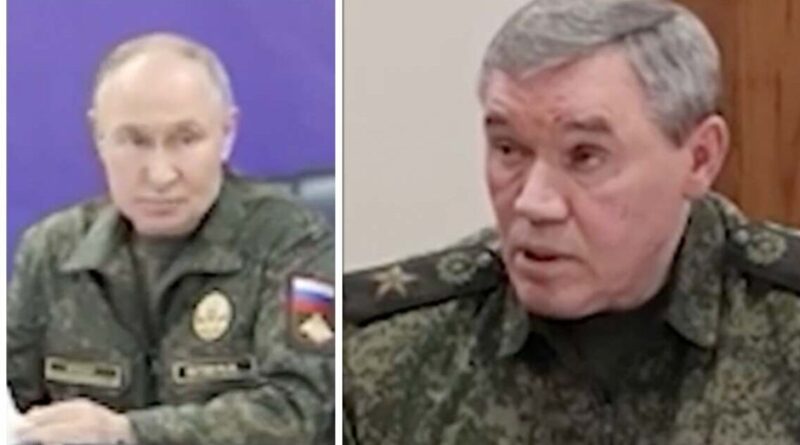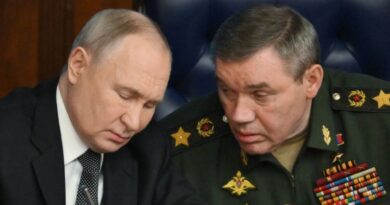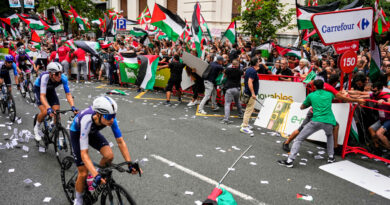Moment top Russian general brazenly lies to Putin | World | News
Russia‘s top general has been caught on camera brazenly misleading President Vladimir Putin with bogus battlefield triumphs in a move which has angered experts and even Kremlin hardliners. The incident occurred during a televised briefing broadcast on Russian state media. Valery Gerasimov, Chief of the General Staff, addressed Putin in the Kremlin, stating that Russian forces had achieved “non-stop advances along the entire front line.”
Gerasimov reported that troops had encircled 5,500 Ukrainian soldiers near Pokrovsk in Donbas, trapping 31 battalions in the Pokrovsk-Myrnohrad region by severing supply lines. He added that forces had captured crossings over the Oskil River in Kharkiv Oblast, isolating an additional 18 battalions, and secured over 70% of Vovchansk, a border city. He also cited advances near Lyman and Kostyantynivka in Donetsk, Luhansk, Zaporizhia, and Kherson oblasts.
The briefing, held on September 17, took place as the war entered its 44th month since Russia‘s full-scale invasion on February 24, 2022. Russian state media presented the report as an update on military operations.
However, independent analyses quickly contradicted the claims.
The Institute for the Study of War (ISW), in its September 18 assessment, described the reported encirclements in Pokrovsk and Kupiansk as “pure fiction,” based on satellite imagery and open-source intelligence that showed no evidence of large-scale isolations.
Ukrainian military officials reported ongoing defensive operations, including the repulsion of assaults near Kupiansk, rather than the defeats outlined by Gerasimov.
Subsequent media reports noted that Russian territorial gains since March 2025 amounted to less than 1,000 square kilometres, according to verified data. This figure contrasts with Gerasimov’s claims from August 30, 2025, of 3,500 square kilometres captured and 149 settlements taken.
Similar discrepancies appeared in 2024, when Gerasimov’s announcements of major advances were later revised or disproven by independent monitors and historians.
Reactions within Russia included criticism from pro-war Telegram channels. An anonymous contributor, quoted by Ukrainian news outlet UNN, stated that Gerasimov was “getting ahead of himself again” by inflating figures, possibly to appeal to international observers amid limited progress.
The Guardian reported that these channels, typically supportive of the military, described the territorial claims as exaggerated and detrimental to public confidence in operations. On X, users including military analysts highlighted the inconsistencies, referencing Gerasimov’s history of unverified reports.
The briefing followed an August 2025 summit in Alaska, mediated by U.S. President-elect Donald Trump, where Putin proposed freezing the current front lines in exchange for Ukraine ceding control of Donbas.
Kremlin spokesperson Maria Zakharova reiterated demands for Ukraine‘s demilitarisation, neutrality, and cessation of Western alliances—conditions rejected by Kyiv as unacceptable. Gerasimov’s report, delivered directly to Putin, emphasised continued offensives rather than the proposed de-escalation.
As of October 2025, Ukrainian forces maintain fortified positions in the Donbas “Fortress Belt,” facing challenges with recruitment, while Russian operations continue in areas like Pokrovsk. ISW assessments indicate ongoing attrition for both sides, with Russian advances limited to incremental gains.
The discrepancies in Gerasimov’s briefing have been cited by analysts as evidence of challenges in the Russian command structure, where reporting may prioritise positive narratives over accurate assessments.
As winter sets in across eastern Ukraine, temperatures have dipped below freezing in key frontline areas, complicating logistics and troop movements for both sides. Russian forces, reliant on sustained offensives in Donbas, face heightened risks of frostbite and equipment failures, while Ukraine bolsters its defences with Western-supplied winter gear.
No Kremlin response has yet addressed the briefing’s criticisms, and analysts anticipate a seasonal slowdown along the 1,000-kilometre front, potentially extending the stalemate into 2026.





